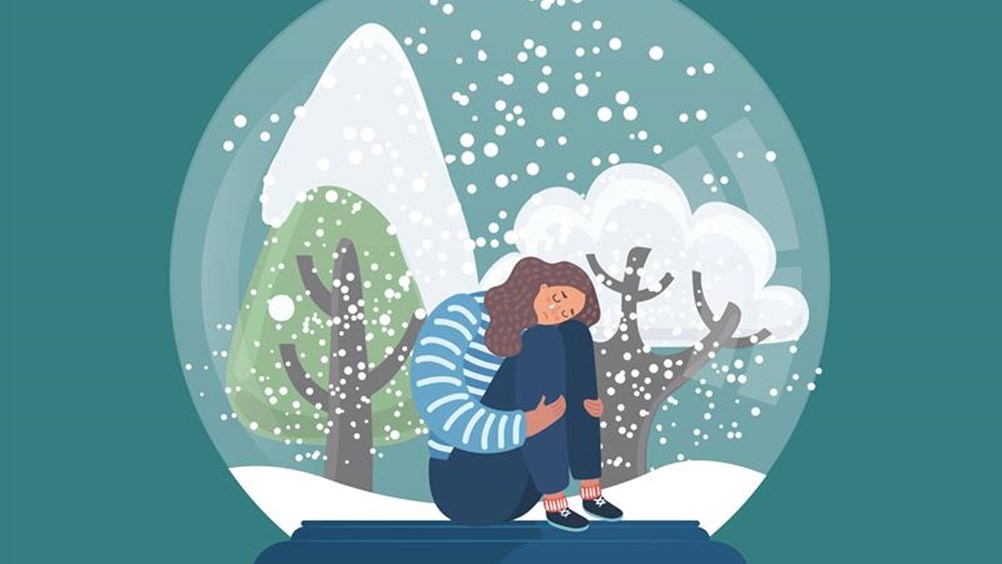By Dana Chatterjee
It’s that time of the year, where days grow shorter and sunlight exposure becomes scarce; a time when loneliness creeps in sneakily and leaves you feeling dull. A lot of people don’t think that seasonal depression exists, but it is real. In a place like Canada where the extreme winters last for four months, seasonal depression is not that uncommon. Seasonal affective disorder (SAD) or ‘extreme winter blues’ is a type of depression that’s related to changes in seasons. For most people, SAD begins at the start of fall and continues into the winter months.
How does SAD occur?
Sunlight exposure stimulates the hypothalamus, a part of the brain that helps control your circadian rhythm — the body’s internal 24-hour sleep-wake clock. Lack of light can throw off your circadian rhythm. This can cause your brain to produce too much of the sleep hormone melatonin and to release less serotonin, the feel-good brain chemical that affects mood. This chemical imbalance leads you to feel low and lethargic.
https://www.wsj.com/articles/SB10001424052748703300504574567881192085174
According to medical professionals, light therapy is one of the best ways to curb and ease symptoms of SAD. It acts as an alternative for sunlight and helps in sapping some energy and light back into peoples’ lives. Light therapy, or phototherapy, involves placing an LED lightbox about 12 inches in front of you in a way that the light gets into your eyes without you having to stare directly at the lamp’s LED bulbs.
It’s normal to have some days when you feel down. But if you feel down for days at a time and you can’t get motivated to do activities you normally enjoy, you should see a health care provider. This is especially important if your sleep patterns and appetite have changed, you turn to alcohol for comfort or relaxation, or you feel hopeless or think about suicide.
Whenever you find yourself feeling empty or lost, take some time out for yourself and try understanding why you feel what you feel. Journaling or penning down thoughts helps several people in letting out grief. What you’re going through is acknowledged, and you are not alone. Always reach out to your family and friends, they care about your mental health—they care about you. Talking to your loved ones can do wonders in lifting your mood.
Mental Health Resources:
The UPEI community offers several resources for mental health support both on and off-campus.
- UPEI Student Affairs offers several resources and supports, such as personal counselling, chaplaincy services, academic coaching, accessibility services, Aboriginal student support, and much more!
- UPEI Counselling Services is staffed by professionally certified counsellors who provide short term interventions for personal, developmental, and mental health issues including (but not limited to) depression, anxiety, relationship concerns, family difficulties, identity issues, stress, and emotional trauma as well as crisis response.
- UPEI Student Health Centre can provide referrals to a psychiatrist, if appropriate, and discuss different options and supports available. The nurse and physicians can provide helpful guidance on how to improve sleep patterns, reduce anxiety, make healthier nutrition choices, and more.
- Canadian Mental Health Association of PEI has a directory of self-help and community resources.
- HealthPEI offers Mental Health and Crisis Response Services.
- International Students looking for mental health information in languages other than English: Multicultural Mental Health Resource Centre and Centre for Addiction and Mental Health
Just like winter passes onto spring, this phase too will pass. It is okay to not feel okay, but we don’t let that feeling reside in our hearts; we seek help.
References:
https://www.health.harvard.edu/mind-and-mood/shining-a-light-on-winter-depressionhttps://www.mayoclinic.org/diseases-conditions/seasonal-affective-disorder/symptoms-causes/syc-20364651
